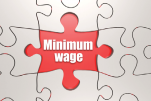The 2016 legislation setting up the schedule to increase the minimum wage, SB 3 (Leno; D-San Francisco), enabled the Governor to postpone by a year any of the annual step increases in the event of a major economic recession or state budget crisis.
Sponsors of the bill touted this temporary offramp as an improvement upon the then-proposed minimum wage increase ballot measure. Including the offramp likely made the difference in the bill’s passage.
Criteria for Postponing Increase
The purpose of assessing the economy, in the words of the statute, is “to ensure that economic conditions can support a minimum wage increase.” This is how the assessment works:
• Is total seasonally adjusted nonfarm employment in June 2020 less than in March 2020,
or
• Is total seasonally adjusted nonfarm employment in June 2020 less than in December 2019,
and
• Are retail sales and use tax revenues for 2019–20 less than those revenues for 2018–19?
Current state conditions translate to checkmarks for all three criteria. The most conspicuous characteristics of this recession are massive unemployment and crashing retail sales.
The minimum wage law is designed with economic sensitivity; if postponement is not indicated under this dire economic circumstance, then just when would this offramp apply?
The Governor has an opportunity by August 1 to help some of the most distressed businesses get back on their feet and rehire their workers by using his existing authority to postpone for one year the automatic increase in the minimum wage.
A fiscal analysis from the Department of Finance is expected at the end of this month. If the analysis concludes that economic conditions allow for suspension, then the Governor would be justified in using his authority to postpone the 2021 increase in the minimum wage until 2022. The jobs of thousands of low wage workers may hang in the balance.


